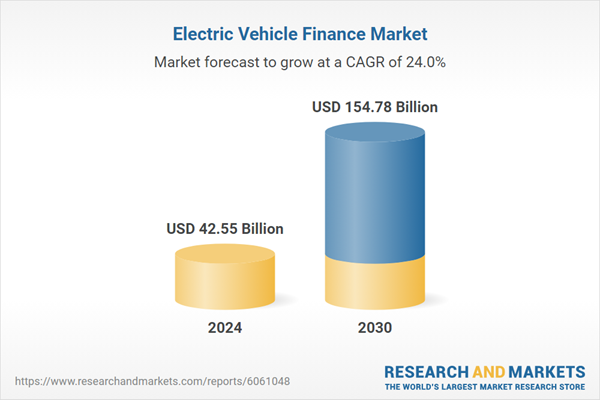Speak directly to the analyst to clarify any post sales queries you may have.
10% Free customizationThis report comes with 10% free customization, enabling you to add data that meets your specific business needs.
Key Market Drivers
Rising Adoption of Electric Vehicles and Sustainability Trends
The growing adoption of electric vehicles globally is a major driver for the EV finance market. Governments and consumers alike are increasingly prioritizing sustainability, reducing carbon footprints, and transitioning toward cleaner energy solutions. In 2023, new electric vehicle (EV) registrations in the United States reached 1.4 million, reflecting a year-over-year growth of over 40% compared to 2022. With stricter emissions regulations and rising fuel prices, EVs are becoming a preferred alternative to traditional internal combustion engine (ICE) vehicles.The shift is particularly pronounced in developed nations like the U.S., Germany, and China, where supportive policies and incentives encourage consumers to switch to EVs. As demand for EVs increases, financial institutions and automakers are developing tailored financing solutions such as low-interest loans, flexible leasing options, and subscription-based models to make these vehicles more affordable. The availability of such financing options enhances consumer confidence and accelerates EV adoption, contributing to the rapid expansion of the EV finance market worldwide.
Key Market Challenges
High Initial Cost and Limited Resale Value of Electric Vehicles
One of the primary challenges facing the EV finance market is the high initial cost of electric vehicles compared to traditional internal combustion engine (ICE) vehicles. Despite decreasing battery costs and government incentives, EVs still have a higher upfront price, making them less accessible for many consumers. This higher cost creates difficulties for financial institutions when structuring loans or leases, as customers may require longer repayment terms or lower interest rates to make financing viable. Additionally, the uncertain resale value of EVs presents a risk for both lenders and lessees. The rapid advancement of battery technology means that older EV models depreciate faster than their ICE counterparts, making it harder to predict the vehicle’s residual value at the end of a loan or lease term. As a result, banks and automakers must carefully assess depreciation risks, which may lead to higher interest rates or stricter financing terms, limiting market expansion.Key Market Trends
Growth of Subscription-Based and Flexible Ownership Models
A significant trend in the EV finance market is the rise of subscription-based and flexible ownership models, providing consumers with more adaptable financing options. Traditional auto loans and leases often require long-term commitments, but many consumers, especially younger generations, prefer flexibility in vehicle ownership. Subscription-based models allow users to pay a monthly fee that covers the cost of the EV, insurance, maintenance, and charging, eliminating the burden of ownership while making EVs more accessible. Companies like Tesla, Hyundai, and BMW are experimenting with such services, offering consumers the ability to switch or return vehicles without long-term obligations. This trend is also gaining traction in ride-sharing and corporate fleets, where businesses prefer to scale their EV usage dynamically without large upfront investments. As consumers prioritize convenience and financial institutions seek to reduce risk exposure, subscription-based financing is expected to become an essential part of the EV finance ecosystem.Key Market Players
- Hyundai Motor Finance
- Goldman Sachs Group, Inc.
- Ford Motor Credit Company LLC
- Morgan Stanley & Co. LLC
- JPMorgan Chase Co.
- BMW Financial Services NA, LLC
- UBS Group AG
- Volkswagen Financial Services AG
- Banc of America Securities LLC
- Tesla Financial Services GmbH
Report Scope:
In this report, the Global Electric Vehicle Finance Market has been segmented into the following categories, in addition to the industry trends which have also been detailed below:Electric Vehicle Finance Market, By Vehicle Type:
- Passenger Car
- Commercial Vehicle
- Two-Wheeler
- Three-Wheeler
Electric Vehicle Finance Market, By Financial Institution:
- Bank
- NBFC
Electric Vehicle Finance Market, By Region:
- North America
- United States
- Canada
- Mexico
- Europe
- France
- United Kingdom
- Italy
- Germany
- Spain
- Asia-Pacific
- China
- Japan
- India
- South Korea
- Vietnam
- South America
- Argentina
- Colombia
- Brazil
- Middle East & Africa
- South Africa
- Saudi Arabia
- UAE
- Turkey
Competitive Landscape
Company Profiles: Detailed analysis of the major companies present in the Global Electric Vehicle Finance Market.Available Customizations:
With the given market data, the publisher offers customizations according to a company's specific needs. The following customization options are available for the report.Company Information
- Detailed analysis and profiling of additional market players (up to five).
This product will be delivered within 1-3 business days.
Table of Contents
Companies Mentioned
- Hyundai Motor Finance
- Goldman Sachs Group, Inc.
- Ford Motor Credit Company LLC
- Morgan Stanley & Co. LLC
- JPMorgan Chase Co.
- BMW Financial Services NA, LLC
- UBS Group AG
- Volkswagen Financial Services AG
- Banc of America Securities LLC
- Tesla Financial Services GmbH
Table Information
| Report Attribute | Details |
|---|---|
| No. of Pages | 184 |
| Published | March 2025 |
| Forecast Period | 2024 - 2030 |
| Estimated Market Value ( USD | $ 42.55 Billion |
| Forecasted Market Value ( USD | $ 154.78 Billion |
| Compound Annual Growth Rate | 24.0% |
| Regions Covered | Global |
| No. of Companies Mentioned | 10 |









